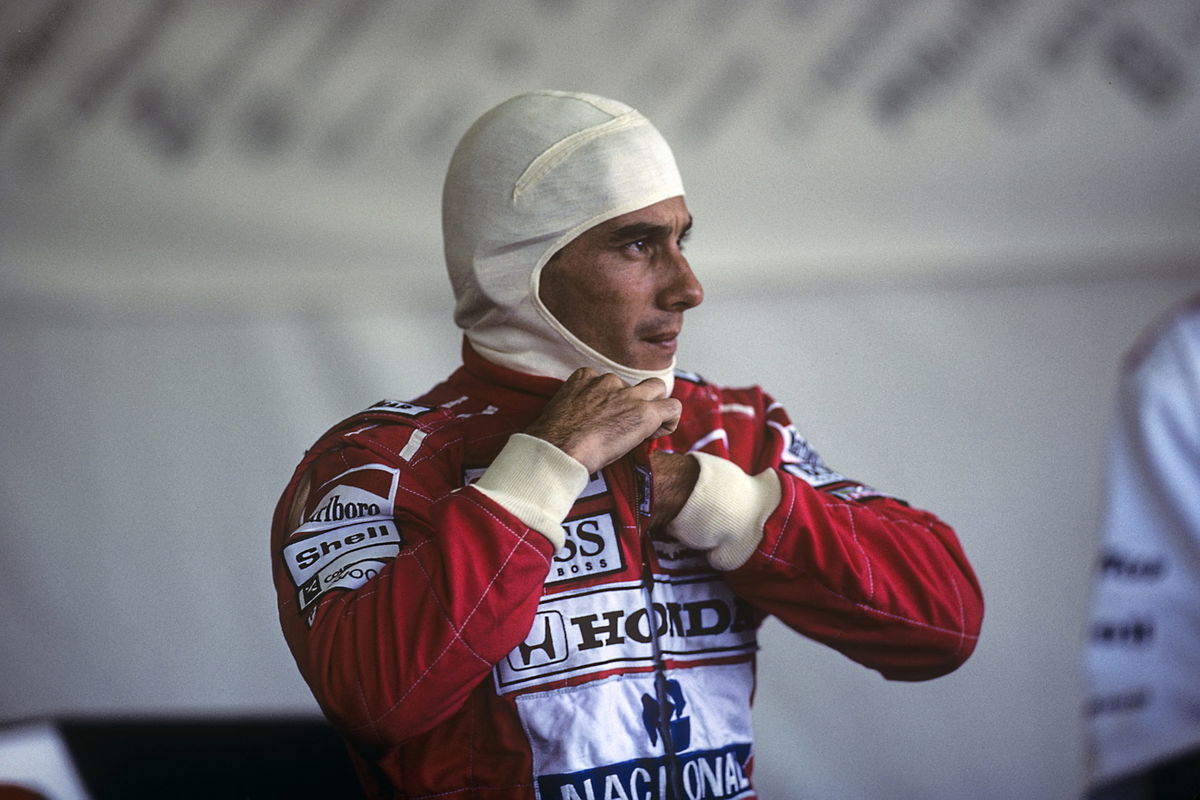
Getty
Ayrton Senna, Grand Prix of South-Africa, Kyalami, 01 March 1992. (Photo by Paul-Henri Cahier/Getty Images)

Getty
Ayrton Senna, Grand Prix of South-Africa, Kyalami, 01 March 1992. (Photo by Paul-Henri Cahier/Getty Images)
Every racing driver, fan, and enthusiast now lives by the following words, “If you no longer go for a gap that exists, you no longer a racing driver.” These words were made immortal by F1 legend, Ayrton Senna. Just like his words, the Brazilian defined the ethos of racing and motorsport. And while he is revered and idolized by his fans, his rivals, and the current generation of F1 drivers, he still was human after all. Two moments in the career of the legendary McLaren driver stand testament to this. The first was on display for everyone to see at the 1990 Japanese Grand Prix.
Watch What’s Trending Now!
One year on from the gut-wrenching political defeat of his second F1 title bid in 1989, he came face-to-face with his arch-nemesis on the very battleground where he had succumbed to the whims of the FIA a year earlier. It was Prost versus Senna once again. And this time it was Senna who would decide the fate of the championship. Cliched but true, the two title rivals collided at the start. Alain Prost was out, and so was Senna. But the scoreboard declared the Brazilian as a two-time F1 champion.
ADVERTISEMENT
Sir Jackie Stewart exposed Ayrton Senna’s lies
The other incident that marks Senna’s vulnerability was what happened in the aftermath of the race. Did Senna intentionally take his competition out? If he did then he’d have killed two birds with one stone; revenge for ’89 and redemption in ’90. But the Brazilian never admitted to it. Well, at least not to the media. And it quickly became a touchy subject for Senna who was arguably busy fighting his own morality.
ADVERTISEMENT
Naturally, when 3x champion Sir Jackie Stewart posed this question to him in that infamous interview after the race, it agitated Senna. The rant that followed gave birth to the iconic quip. “I think I asked the right question. Nobody was prepared to ask the question I asked,” explained Stewart while referring to the heated interview with Senna in a recently resurfaced clip.
ADVERTISEMENT
“And what he said to me that day was that he would never speak to me again. But one and a half years later, he phoned me up and said, “Look, I’m sorry.” Because he said then that he did not intentionally do it [crash into Alain Prost]. He later admitted that he did do that intentionally to Prost. And when he phoned me back he said, ‘Look, I apologize, I told you a lie’.”
Top Stories
Adrian Newey’s Motorsport Masterpiece: RB17 vs Aston Martin Valkyrie, Which One Is Better?

Who Is Oscar Piastri’s Father, Chris Piastri? Co-Founder of Multibillion Dollar Automotive Company

3 Years After His Death, Niki Lauda’s Wife Brutally Disrespects Him to Initiate $32,000,000 Battle Against Own Children

Carlos Sainz & Ex Girlfriend Isa Hernaez Issue Contrasting Statements to Stir the Pot After Unexpected Breakup

Who Is Canadian F1 Billionaire Lawrence Stroll’s Daughter & Heiress Chloe Stroll?

In the aftermath of the whole fiasco, we saw a more human side to Senna. One who was prone to err and succumb to his instincts. However, the interview with Stewart was also a window into the relentless urge for him to win. That is what defined the man till the very end.
ADVERTISEMENT
The mantra of Ayrton Senna to winning in Formula 1
At the end of the day, Senna has three world championships to his name. The late Brazilian however, is still considered by many to be the greatest F1 driver of all time, even surpassing the likes of Michael Schumacher and Lewis Hamilton. And this comes down to the sheer genius he displayed on track, and the commitment towards greatness off of it.

Imago
Siegerehrung nach dem GP von Monaco 1993: Sieger Ayrton Senna Brasilien / McLaren Ford Cosworth jubelt den Anhängern zu
In the same interview, Senna was quoted as vehemently responding to Stewart’s ‘accusations’. The McLaren driver then famously quipped, “You should know that by being a racing driver you are under risks all the time.”
ADVERTISEMENT
“Being a racing driver means you are racing with other people and if you no longer go for a gap that exists, you are no longer a racing driver – because we are competing, we are competing to win, and the main motivation to all of us is to compete for the victory.”
Watch this Story | Fernando Alonso Appreciating Teammate Lance Stroll’s Overtaking Move at Miami GP
ADVERTISEMENT
Is Ayrton Senna really the greatest Formula 1 driver of all time?
ADVERTISEMENT
ADVERTISEMENT
ADVERTISEMENT

